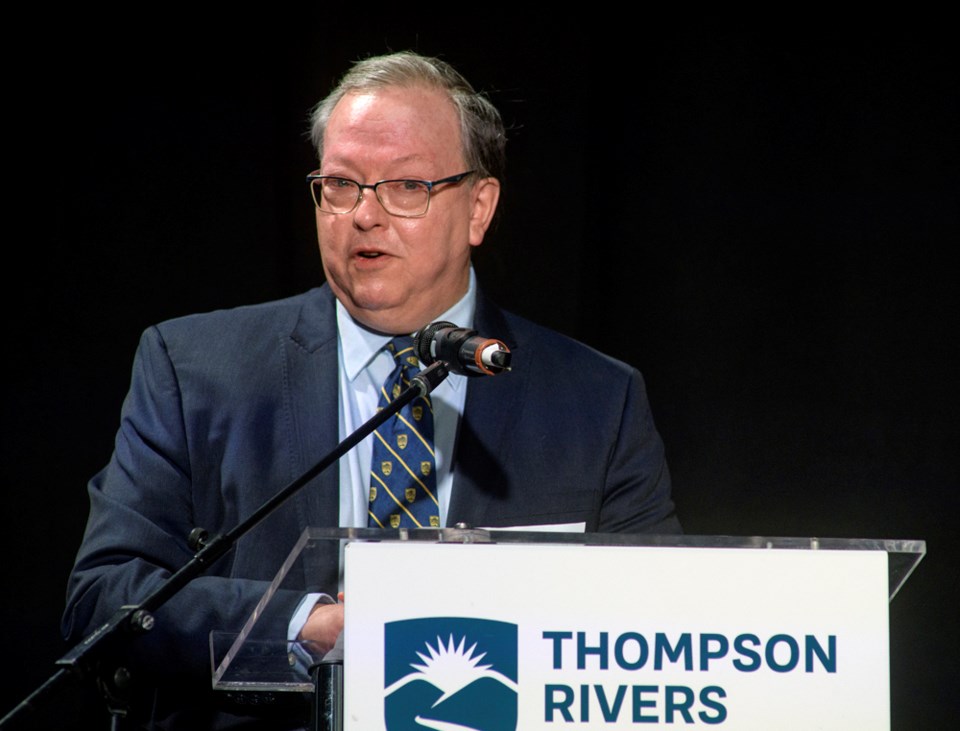The president of Thompson Rivers University has implemented a controversial new procedure that aims to keep information about the public institution out of the hands of reporters and out of the headlines — and it's already drawing concern on and off campus.
The move comes in response to Castanet Kamloops’ coverage of the university dating back more than a year. Castanet reporters have been covering TRU closely since the start of 2023, and that job includes scouring the university’s board and senate agenda materials for newsy items.
This manner of coverage has resulted in the publication of dozens of stories that would have otherwise gone unreported. No other local media outlet dedicates regular coverage to TRU governance and finance matters.
TRU President Brett Fairbairn outlined the new procedure at the start of a senate meeting on Monday. In his remarks, in which he took full credit for the change, he said news coverage of agenda items was “disrespectful” to the university's senators.
Under the previous procedure, all agendas and supporting materials — often including newsy reports prepared by university staff — were supposed to have been made public one week ahead of a meeting; now, bare-bones agendas are published a week in advance but supporting materials, which are required to be made available publicly, are only shared three hours before a meeting begins.
Concerns about transparency
Fairbairn said he took particular issue with the coverage of his president’s reports, which typically provide a concise high-level overview of noteworthy goings on at TRU from the perspective of the university's top employee. He said he wasn’t going to allow that to stand.
“The media have discovered those written reports as a convenient way to obtain quotable information about what’s going on at TRU, and that isn’t the audience that I’m writing them for,” he said.
"If I were looking to write a media release, I would write a media release. Those reports are for you as senators."
TRU Sen. Juliana West, from the faculty of education and social work, pushed back on the change, accusing Fairbairn of making the university appear more opaque than it needs to.
“I’m concerned that this change will create declining perceptions about the openness and transparency of TRU business,” she said. "I do not believe that this is in line with collegial governance.”
No more president's report?
When questioned by West, Fairbairn said he might stop writing a president’s report altogether — a route he said he is “reluctant” to take. Then he doubled down on his desire to keep university information secret.
“It certainly would make it easier for me if I didn’t have to worry what the media would think about my comments [in the president’s report],” he said.
“My preference is certainly that I continue to give you a substantial report on the most important topics facing the university as I see them, but to do that in writing is not compatible with the media’s recent practice.”
Fairbairn also told senators he thought they should be above having to read about their business in the news.
“I do think it detracts from the gravitas and the dignity, if you like, of a governing body,” he said.
“If reports that are coming to you have been widely discussed and pre-digested in the media, it certainly detracts from the immediacy and from the characteristics of senate as a deliberative assembly.”
'It's taxpayer money'
Dale Bass, a Kamloops city councillor who worked for decades as a reporter, said the move will make it harder for local journalists to cover the business of TRU — and that will leave the community less informed about the university.
As a public university, she said it's especially important for the TRU to be transparent and accountable.
"When you are a public institution receiving public money, you have an obligation to let the public know how you are using that money, because it’s taxpayer money in the end,” she said.
"To have the president of the university say if he wants to send out a news release he’ll send it out assumes that he knows what everyone is interested in. If they don’t want anyone to know about it then they shouldn’t be doing it.”
'Quite frankly, it's silly'
Bass said the change sets a number of alarm bells ringing for her.
“They’re trying to tell people what they should know,” she said.
“If I was a reporter, I would think they were doing this to try to hide stuff. Transparency and accountability matter. And three hours is silly — quite frankly, it’s silly."
Castanet asked Bass what she thought might happen if the City of Kamloops, which distributes its full agenda package publicly four days before each city council meeting, tried to implement a similar procedure.
“We can’t — how could we?” she said. “People would be screaming."
Board documents also kept secret
At Monday's meeting, Fairbairn encouraged senators to bring forward to him any concerns they have with the change.
Castanet sought clarification on the new procedure from TRU. Robert Koopmans, the university's executive communications officer, confirmed agenda packages for future board of governors meetings will be distributed in the same manner — only available three hours ahead of time.
When asked to clarify the procedure further, Koopmans pointed to the comments Fairbairn made during Monday's meeting.
Castanet asked why its newsroom was not provided more information about the change, even after asking. An email last week inquiring about the new procedure received no response.
Koopmans said he got busy and forgot to reply.



